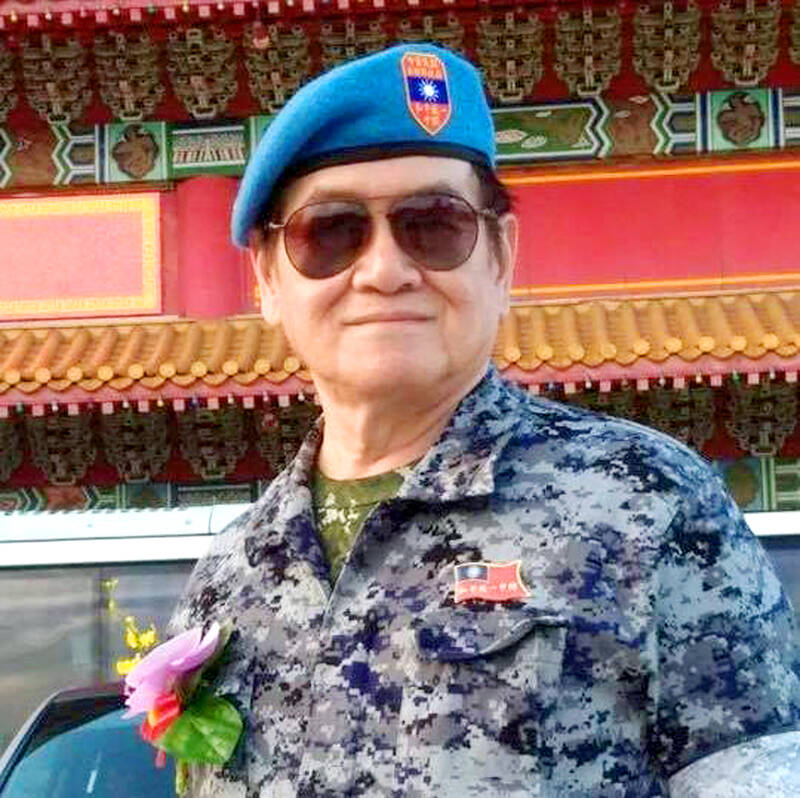A retired lieutenant general has been charged after using funds from China to recruit military personnel for an “armed” group that would assist invading Chinese forces, prosecutors said yesterday.
The retired officer, Kao An-kuo (高安國), was among six people indicted for contravening the National Security Act (國家安全法), the High Prosecutors’ Office said in a statement.
The group visited China multiple times, separately and together, from 2018 to last year, where they met Chinese military intelligence personnel for instructions and funding “to initiate and develop organizations for China,” prosecutors said.

Photo: screen grab from Kao An-kuo’s Facebook page
Their actions posed a “serious threat” to “national security and social stability,” the statement said.
After retiring from the army, Kao and another defendant used Chinese funds to form “an armed organization” — the “Republic of China Taiwan Military Government” — that would act as an “internal collaborator” if China attacked Taiwan, it said.
They also engaged in “scouting, contacting, wooing and absorbing retired and active service members,” putting national security in a “dangerous state,” it added.
Prosecutors have sought a minimum jail term of 10 years for Kao, saying that he failed his “high duty of loyalty to the country as a retired lieutenant general deputy commander for the sake of personal gain.”
The other defendants face up to eight years in jail, prosecutors said.
The statement did not say how much money Kao or the others received, but it has previously reported that the six defendants collectively received more than NT$9.62 million (US$293,525) in funding from China.
There has been a series of spying cases in Taiwan, as China maintains military and political pressure on Taipei.
The National Security Bureau said in a recent report that the number of people prosecuted for spying for Beijing has “increased significantly,” from 10 in 2022 to 64 last year.

SECURITY: As China is ‘reshaping’ Hong Kong’s population, Taiwan must raise the eligibility threshold for applications from Hong Kongers, Chiu Chui-cheng said When Hong Kong and Macau citizens apply for residency in Taiwan, it would be under a new category that includes a “national security observation period,” Mainland Affairs Council (MAC) Minister Chiu Chui-cheng (邱垂正) said yesterday. President William Lai (賴清德) on March 13 announced 17 strategies to counter China’s aggression toward Taiwan, including incorporating national security considerations into the review process for residency applications from Hong Kong and Macau citizens. The situation in Hong Kong is constantly changing, Chiu said to media yesterday on the sidelines of the Taipei Technology Run hosted by the Taipei Neihu Technology Park Development Association. With

A US Marine Corps regiment equipped with Naval Strike Missiles (NSM) is set to participate in the upcoming Balikatan 25 exercise in the Luzon Strait, marking the system’s first-ever deployment in the Philippines. US and Philippine officials have separately confirmed that the Navy Marine Expeditionary Ship Interdiction System (NMESIS) — the mobile launch platform for the Naval Strike Missile — would take part in the joint exercise. The missiles are being deployed to “a strategic first island chain chokepoint” in the waters between Taiwan proper and the Philippines, US-based Naval News reported. “The Luzon Strait and Bashi Channel represent a critical access

CARROT AND STICK: While unrelenting in its military threats, China attracted nearly 40,000 Taiwanese to over 400 business events last year Nearly 40,000 Taiwanese last year joined industry events in China, such as conferences and trade fairs, supported by the Chinese government, a study showed yesterday, as Beijing ramps up a charm offensive toward Taipei alongside military pressure. China has long taken a carrot-and-stick approach to Taiwan, threatening it with the prospect of military action while reaching out to those it believes are amenable to Beijing’s point of view. Taiwanese security officials are wary of what they see as Beijing’s influence campaigns to sway public opinion after Taipei and Beijing gradually resumed travel links halted by the COVID-19 pandemic, but the scale of

Pope Francis is be laid to rest on Saturday after lying in state for three days in St Peter’s Basilica, where the faithful are expected to flock to pay their respects to history’s first Latin American pontiff. The cardinals met yesterday in the Vatican’s synod hall to chart the next steps before a conclave begins to choose Francis’ successor, as condolences poured in from around the world. According to current norms, the conclave must begin between May 5 and 10. The cardinals set the funeral for Saturday at 10am in St Peter’s Square, to be celebrated by the dean of the College